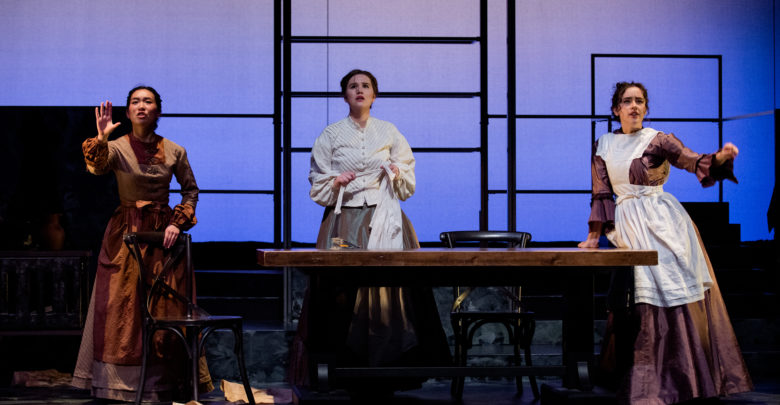‘Brontë’ reimagines the life of famous Brontë sisters
Brontë allows viewers to understand the turmoil of the Brontë sisters' lives while connecting their experiences with those in the present.
 Brianne Jang of BB Collective
Brianne Jang of BB CollectiveAs someone who hasn’t read a lick of the Brontë sisters’ work, I expected Brontë to be a production that alienated me. Instead, I was drawn into a story of the ever-changing nature of human life.
Brontë follows the story of the Brontë family, focusing on the life of the three sisters: Emily (Heeyun Park), Anne (Donna-Leny Hansen), and Charlotte (Emily Lizotte). As the audience learns more about the Brontë family, we see more and more of the disfunction present in their lives, and how desperately each of them holds onto their desired realities.
Interestingly, the production uses the sisters’ books to explore their inner thoughts. For Charlotte, her desires are contrasted by the depravity of Bertha (Karen Gomez) from Jane Eyre and her own traditional values. As Emily questions the grotesque morals of society, she echoes the melancholy and regret of Cathy (Kristin Unruh) from Wuthering Heights. Unlike her two sisters, Anne engages with her work, The Tenant of Wildfell Hall, the least.
However, Anne’s personality shines through in other scenes, where she acts in a carefree manner. I found Anne’s character development the most interesting throughout the production, as the further along it was, the more obvious it was that this Brontë sister was somewhere in-between the traditional Charlotte and her moody and sometimes rebellious sister, Emily. Interestingly enough, Brontë also hints at Anne’s desire for justice — most famously displayed through The Tenant of Wildfell Hall, which is considered one of the first feminist novels.
Brontë also makes interesting commentary about sexism and the role women are expected to play. Although the production is set in the Victorian Era, over one century ago, many of the themes still hold true today. As Charlotte shoulders responsibility and gives up her dreams as the eldest child in her family, and Emily questions the morals of a society that forces women to act a certain way, the audience is able to connect with the family in ways that may have been impossible prior to their humanization.
Although Brontë tells the story of the Brontë sisters, their relationship with their brother Branwell (David Woroner) and their father Patrick (Michael Peng) is complex. Through the story of the whole family, the topic of sexism creates a contrast for what Branwell may do, and what is expected of the sisters.
Amanda Goldberg, director of the show, explained that although Branwell is someone who benefits from the sacrifices of his sisters, he’s also someone who suffers from the expectations for men during the period.
“During this time … geographically where these people were located, all they had was each other,” Goldberg said. “They are so dependent [on] and have such strong connections with each other, Branwell really becomes a link to the outside world because of the opportunities he had as a man growing up during that time. That can definitely relate to the privileges that men have even nowadays.”
“We got to really see see his journey that’s completely different from all the other siblings because all the other siblings are living in a world where their hopes and aspirations are too big. They’re living in a world that wasn’t built for them. Whereas Branwell … crumbles under these huge expectations that have been set for him as the only boy sibling.”
Because the production is a coexistence of the present and the past, the main goal of Brontë is for the audience to answer questions towards themselves. Although Brontë strays from a strictly historical retelling of the Brontës story, die-hard fans of the Brontës’ work can still expect to see the lives of their favourite authors explored.
“For people who know [the Brontës] and love them, I hope audiences are ready to challenge their expectations, or at least be open to meeting a completely new interpretation of the family and their characters. We really built them as extensions of ourselves.”
The Brontë family encounters various challenges, from failures to publish their work, to Branwell’s substance addiction. Through these stories, the sisters who are so well-known for their passionate work, feel human again.
“History is simply a story that someone got to tell and I think we found a lot of freedom in that kind of mantra,” Goldberg said. “We are using the story of the Brontës as a platform to tell our own story. And in our story, the Brontës aren’t untouchable celebrities.”
“They’re these people who struggle, … make terrible mistakes, and hurt people they love most in the world. It’s a play about dependence on one another, the importance of having people, [and] the importance of being loved.”
Brontë is showing at the Timms Centre for the Arts from May 13 to 21.




